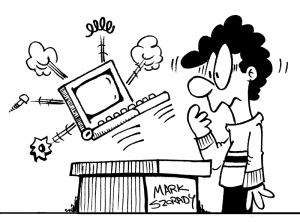
Here you have…a Windows infected computer.
“Here You Have…” a Windows Virus
It happened again. Last week, a rather vicious virus called “Here You Have” ran rampant on the internet and infected systems in top companies like ABC/Disney, ComCast, and Proctor and Gamble.
The virus spread through email. Once launched, it infected the user’s system, grabbed his/her email address book, and started spamming away while disabling security software.
The virus was disguised as a PDF. It appeared as a file/attachment from a friend. Once clicked by the the user, an executable file (.exe) would launch.
Twitter filled up with messages from folks who were already infected. “Good Morning America’s” weatherman tweeted that his email account was being filled up by a huge email-spam virus.
When news of the virus broke, I immediately started looking for more information. I came across the Yahoo News article which stated,
“As you may have guessed, the URL doesn’t actually take you to a PDF, but instead to an executable with the extension .scr. While the domain linked to in these infected e-mails is no longer live, infected computers can still be spreading virus messages. When the virus is run, it installs itself as CSRSS.EXE in the Windows directory, then e-mails the contents of your address book. It also spreads through mapped drives, remote machines, and removable media. The virus then attempts to download files and delete security software, including virus protection.”
Did you notice that one line? ” When the virus is run, it installs itself as CSRSS.EXE in the Windows directory,…”
Windows. Once again, people running Windows were the target. And it appears that anti-virus software, that all Windows users are strongly urged to have (and routinely update), either didn’t work or wasn’t enabled.
This is the main reason why I switched to Linux about six years ago. I was tired of constantly looking over my shoulder for the next big threat to hit my Windows system.
Since switching, I have piece of mind. I have a safe, secure, and stable computer system. I no longer worry about Windows viruses because Linux is immune to them.
With Linux, I run cutting edge software and a lightening fast desktop (thanks to not having anti-virus applications constantly hogging resources). And if I have a question or problem, help from a wonderful community of users is only a keystroke away .
Get the Windows target off your back. Get Linux.



ESET confirms this
http://kb.eset.com/esetkb/index?page=content&id=NEWS102&actp=LIST
(Posted this from my Linux PC but I’m running NOD32 on my Windows machine.)
Thanks, Gary!:)